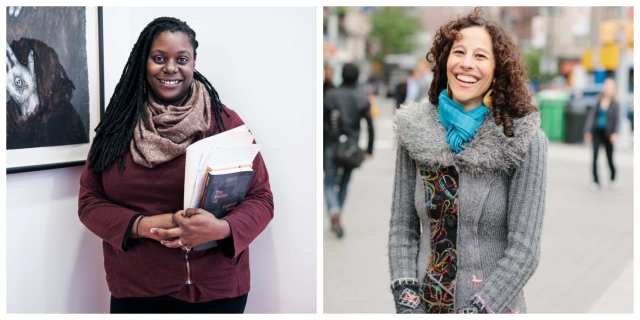NSSR Faculty Win Major 2019-2020 Research Grants
From the many celebrations and reflections that accompany the centennial of The New School throughout 2019, on thing has become abundantly clear: Many of the issues early New School scholars sought to address continue to be central to our thinking today. From the effects of borders and migration on refugees to rising fascism and anti-democratic politics, concerns about capitalism to growing inequality, today’s New School for Social Research faculty members are launching bold new investigations into these pressing questions, and several have won major grants to carry out this important work for the coming academic year.

Deva Woodly, Associate Professor of Politics, has been named a 2019-2020 Fellow-in-Residence at the Edmond J. Safra Center for Ethics at Harvard University. She focuses her attention on the ways that public meanings define the problems that the polity understands itself to share, as well as the range of choices that citizens perceive to be before them. Drawing primarily from newspapers and social media, she examines public discourse and its central practical importance to democratic politics.
While at the Safra Center, Woodly will be working on two book projects: #BlackLivesMatter and the Democratic Necessity of Social Movements, which explores the ways that social movements re-politicize public life in times of political despair, and What We Talk About When We Talk About the Economy, which examines public discourse and opinion concerning what “the economy” means to different stakeholders in American politics. While there, she will also participate in the Safra Center’s Working Group on Political Economy and Justice.
Miriam Ticktin, Associate Professor of Anthropology, has been named a 2019-2020 Russell Sage Visiting Fellow. Ticktin is currently at work on two related book projects: a short book on innocence as a political concept, and how it produces an unending search for purity; and a book on the way border wall technologies travel, both transnationally and cross-species, with the goal of engaging with speculative practices, and reimagining the idea of bordering. Over the past year, Ticktin has been co-director (co-PI) of the Mellon Foundation-funded Sawyer Seminar series on Imaginative Mobilities, in which an interdisciplinary group of faculty members and graduate students from the fields of design and social sciences reframed debate on the nature, purpose, and futures of borders.
As a Russell Sage Visiting Fellow, Ticktin will continue work on her second book project. She will investigate the resurgence of border walls as an anti-immigrant tool in the context of rising right-wing and nationalist populisms, concentrating on the proposed border wall between the U.S. and Mexico. Drawing from legal, historical, and ethnographic research, she aims to demonstrate how border walls paradoxically rely on transnational and cross-species technologies, ideas, and economies. She will analyze how the materials and technologies involved in the construction of the U.S.-Mexico border wall offer insight into the politics of borders and how rethinking border design has implications for immigration policies.

Both Virag Molnar, Associate Professor of Sociology, and Julia Ott, Associate Professor of History, have been named 2019-2020 members of the Institute for Advanced Study.
Molnar’s research explores the intersections of culture, politics, social change and knowledge production with special focus on urban culture and transformations of the built environment. She has written about the relationship between architecture and state formation in socialist and postsocialist Eastern Europe, the post-1989 reconstruction of Berlin, and the new housing landscape of postsocialist cities. Her latest book, Building the State: Architecture, Politics and State Formation in Postwar Central Europe (Routledge) received the Mary Douglas Prize for the Best Book in the Sociology of Culture from the American Sociological Association in 2014.
At the IAS, Molnar will continue researching and writing her new book, tentatively titled Marketing Radical Nationalism in Contemporary Hungary, which she began while receiving a fellowship from the American Council of Learned Societies and the Berlin Prize from the American Academy in Berlin. The book explores how markets can serve as crucial vehicles for promoting new interpretations of national identity and circulating nationalist symbols, thereby fostering popular support for nationalist radicalization.
Ott specializes in economic history and political history. Aiming to advance critical histories of capitalism, she investigates how financial institutions, practices, and theories influence American political culture and how, in turn, policies and political beliefs shape economic behavior and outcomes. She was the 2016-2018 co-director of the Robert H. Heilbroner Center for Capitalism Studies and is the author of When Wall Street Met Main Street: The Quest for an Investors’ Democracy (2011).
At the IAS, Ott will work on her latest book project. Wealth Over Work: The Origins of Venture Capital, The Return of Inequality, and the Decline of Innovation examines the history of venture capital as an idea, as a form of investment, and as a politically-mobilized industry. In the half-century after start of the Great Depression, beliefs about the centrality of venture capital for innovation, jobs, and growth shaped economic policy and corporate behavior while gradually transforming U.S. financial system. Concerns about venture capital – voiced from all across the political spectrum – slowly steered American political culture in a neoliberal direction, in favor of investors and the wealthy. The result was the less innovative and far more unequal economy that we live with today.